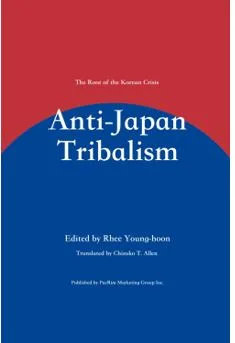Understanding the Roots of Korean-Japanese Tensions: 3 Essential Books
The relationship between Japan and Korea has been shaped by centuries of shared history, but it has been especially strained in the post-WWII era due to unresolved issues related to war crimes, colonialism, and conflicting national identities. One book that delves deeply into the complexities of this relationship is Anti-Japan Tribalism: The Root of the Korean Crisis by Lee Jae-min. If you’re interested in exploring the underlying causes of the ongoing tensions between Japan and Korea, this book, along with two other insightful works, offers a thorough understanding of the history, politics, and culture driving this conflict.
Anti-Japan Tribalism: The Root of the Korean Crisis by Lee Jae-min
In Anti-Japan Tribalism, Lee Jae-min offers a provocative analysis of the persistent anti-Japanese sentiment in South Korea, arguing that these feelings are rooted in tribalism rather than solely historical grievances.
Anti-Japan Tribalism by Lee Jae-min as one of the books exploring the complex dynamics of Japan-Korea relations, including historical narratives, and regional security issues.
The author explores how historical narratives surrounding Japan’s colonial rule of Korea, wartime atrocities, and territorial disputes have been manipulated to stoke nationalistic fervor. He suggests that this “tribalism” has been institutionalized, with various political, educational, and media figures continuously fueling animosity to galvanize political support or deflect attention from internal issues.
Lee’s thesis challenges the more simplistic view of the conflict as being rooted solely in historical facts, such as the comfort women issue or the forced labor during WWII. Instead, he proposes that the conflict is perpetuated by an ingrained cultural and political need to maintain a collective “enemy” in the form of Japan. This book is a critical examination of the role of nationalism in shaping public opinion and political policy in Korea, and it offers a fresh perspective on the long-standing diplomatic impasse between the two nations.
The Korean War: A History by Bruce Cumings
While not directly about Japan-Korea relations, The Korean War: A History by Bruce Cumings offers an essential backdrop to understanding the deep-rooted nationalism and anti-Japanese sentiments that characterize much of South Korea’s political landscape. Cumings, a leading historian on modern Korea, argues that the Korean War (1950-1953) was not just a military conflict but a key moment in the formation of Korean national identity.
The book discusses how the Korean peninsula’s division after WWII created two very different national narratives: one in the North and one in the South. These competing narratives helped shape the way Koreans view foreign powers, including Japan, whose occupation of Korea still looms large in historical memory. For those interested in understanding how Korea’s war-torn past intersects with its contemporary relations with Japan, Cumings’ work is invaluable. It provides the historical context for the nationalistic fervor that Lee Jae-min argues has been used to perpetuate anti-Japanese sentiments in South Korea.
The Japan-Korea Identity Clash: East Asian Security and the United States by Gilbert Rozman
In The Japan-Korea Identity Clash, Gilbert Rozman explores the historical, cultural, and political factors that have fueled tensions between Japan and Korea, particularly in the context of East Asian security. Rozman, a prominent scholar of East Asian politics, argues that the conflict is not merely a product of historical wounds but also an ongoing battle over national identity, which is increasingly framed in the context of the region’s security dynamics and the United States’ role in the area.
Rozman takes a broader approach than Lee Jae-min, placing the Japan-Korea tensions within the larger framework of East Asian geopolitics. He examines how both nations’ identities—shaped by their historical experiences and relations with the U.S.—influence their diplomatic interactions. The book highlights how both countries’ national identities have been constructed in opposition to each other, exacerbating issues like territorial disputes, wartime legacies, and historical interpretations.
If you want to understand not just the historical and cultural roots of Japan-Korea tensions but also the ongoing security and diplomatic challenges they face today, this book is essential.
Why These Books Matter
Understanding the relationship between Japan and Korea requires more than just a focus on historical events like the Japanese occupation of Korea, the comfort women issue, and the territorial disputes over the Dokdo/Takeshima islands. These books provide a more nuanced perspective, offering readers a deeper understanding of the nationalistic, cultural, and political forces that continue to shape the two nations’ relations.
Lee Jae-min’s Anti-Japan Tribalism offers a fresh look at the role of nationalism and tribalism in perpetuating anti-Japanese sentiment, suggesting that these tensions go beyond the surface-level issues often discussed in the media.
Bruce Cumings’ work provides historical context, showing how the Korean War and subsequent division of the peninsula led to competing national narratives that influence the way Korea perceives Japan today. Meanwhile, Gilbert Rozman’s analysis situates Japan-Korea tensions within the broader East Asian geopolitical landscape, offering insight into the regional and international factors that exacerbate the conflict.
Together, these books paint a complex picture of Japan-Korea relations—one that involves not just the legacy of past atrocities, but the ongoing struggle for national identity, political power, and regional security. They are crucial reads for anyone interested in East Asian history, international relations, or the complexities of modern nationalism.


